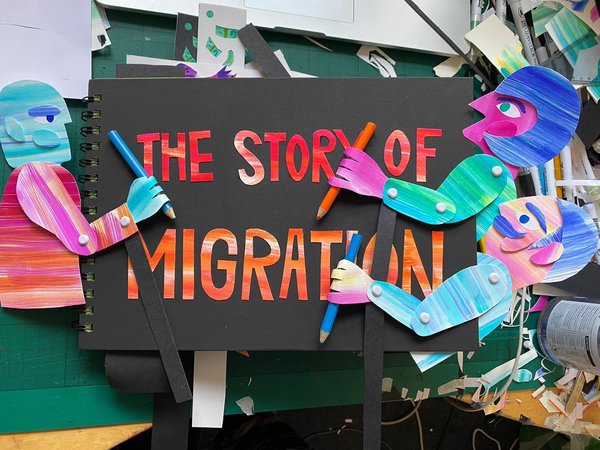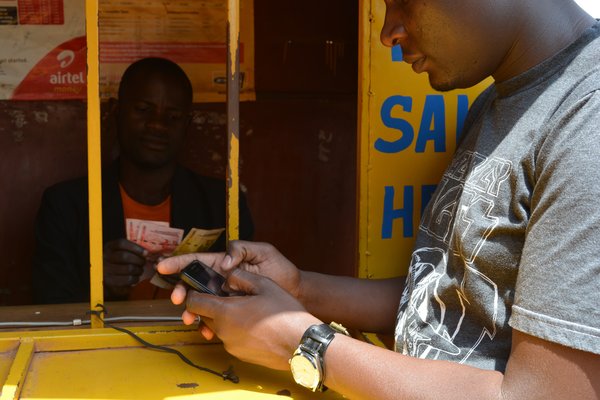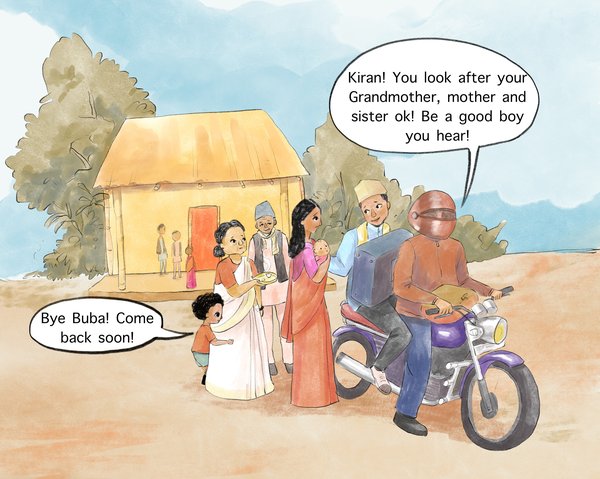
Photo via PositiveNegatives
‘Teaching Migration Through Data And Storytelling’ is a free online CPD course for teachers of students aged 12-18 years starts on 5th December, with Q&A sessions from course makers including Professor Heaven Crawley (UNU Centre for Policy Research), Dr Gameli Tordzro (University of Glasgow), and Jess Barnecutt (Assistant Head Teacher).
This course is brought to you by Migration for Development and Equality (MIDEQ), SOAS, and PositiveNegatives with funding from the UK Research and Innovation (UKRI) Global Challenges Research Fund (GCRF) and SOAS.
There have been urgent recent calls for curricula to address issues of race and migration. Yet 78% of British teachers asked by the Runnymede Trust said they needed more support “to equip them to teach migration more sensitively and effectively.” On this course, teachers can develop their skills to explain where and why migration happens, learn how to interpret big data sets, examine migration research through video and learning activities, and explore creative methods of storytelling, visual arts, and design to humanise migrant stories through the arts and empathic learning.
From the creators of the award-winning Maths of Migration learning resources and teacher CPD, the course brings together teachers from around the world with researchers and creative practitioners from MIDEQ, the UK’s largest academic research project on migration.
The course aims are:
- Developing teachers’ capacities and skills to access big data sets and contemporary research by providing the guidance, tools, and experience through video and learning activities delivered online
- Sharing and shaping understanding of the role of creative methods of storytelling, visual arts, and design to humanise migrant stories through creative and empathic learning
- Exploring the combined importance of both data-led evidence and arts to tackle global challenges such as migration, inequality, and development
- Equipping learners with skills in critical thinking, data, independent investigation, and understanding reliability of sources
Who is the course for?
This course is designed for maths and geography teachers of student’s (particularly aged 12-18) who want to know how to teach migration using data and storytelling. However, it would also appeal to anyone learning from home interested in these issues, or educators and learners interested in critical thinking, data skills, independent investigation, and understanding the reliability of sources.
About the course:
What will you achieve?
By the end of the course, you‘ll be able to...
- Investigate why migration happens
- Explain where migration happens
- Explore ways of introducing large data on migration to learners
- Explore how using infographics will support learners to critically engage with data
- Explore how you can support students to access a large data set
Who will you learn with?
Jessica Barnecutt, is Deputy Headteacher and former Head of Maths at Oaklands School, a high performing, inner-London comprehensive. Her doctoral research at IOE explored project based learning in mathematics, including how students can use maths to explore authentic situations.
Dr Gameli Tordzro researches creative arts and translating cultures, language and education with a focus on African diaspora music, video film production, story and storytelling. He is also the founder, composer and Creative Director of Ha Orchestra and the AdinkraLinks Poetry Network, and Artist in Residence of UNESCO Chair Refugee Integration Through Languages and The Arts (RILA).
Professor Heaven Crawley, is Director of MIDEQ and has nearly 30 years’ experience of undertaking research on international migration in a wide range of institutional settings (government, voluntary sector, national and international organisations, academia). Based at the Centre for Trust, Peace and Social Relations at Coventry University and UNU Centre for Policy Research, Heaven’s research focuses on understanding the relationships between migration and inequality in the context of the Global South.
Dr Anita Ghimire is a research director at the Nepal Institute for Social and Environmental Research. Anita explores migration and mobility, social norms and gender, adolescents and young people, and social protection in addition to evaluation studies of different interventions. She has worked for multi-year and multi-country research commissioned by DFID, UNICEF, IOM, USAID and World Bank among others.
Dr Dereje Feyissa is an eminent Ethiopian scholar with a regional focus on the Horn of Africa. Dereje has extensive fieldwork experience and has conducted research on ethnicity and conflict; Islam in contemporary Ethiopia; the political economy of development and the transnational politics of migrants, among other topics.
Dr Laura Price teaches geography and has produced award-nominated animations, comics, learning resources, and teacher CPD on social and humanitarian issues such global inequality, migration, and the education of women and girls.
Josh Bignell is a secondary Maths teacher with 5 years of teaching experience in schools in London and the North East of England across all levels of confidence in the subject. He specialises in resource development, creating materials and activities that he hopes ‘can convey the wonder and joy that I see in the subject’.
Emily Oliver is Managing Director of PositiveNegatives where she leads on storytelling for learning, participation and innovation. She is currently working on storytelling research with young people with the NHS, Lebanese National Mental Health Programme and Liverpool University.
This course is designed with storytelling researchers at PositiveNegatives, and uses their educational resources and stories about migration to bring the topics to life in classrooms.
For more information please see Teaching Migration Through Data And Storytelling or contact emily@positivenegatives.org / @PosNegOrg. Visit PositiveNegatives Learning for more information and resources.
Special thanks to the London International Development Centre & Migration Leadership Team, jointly funded by the Economic & Social Research Council (ESRC) and Arts & Humanities Research Council (AHRC), for permission to feature the Life On The Move animation, produced with PositiveNegatives.



